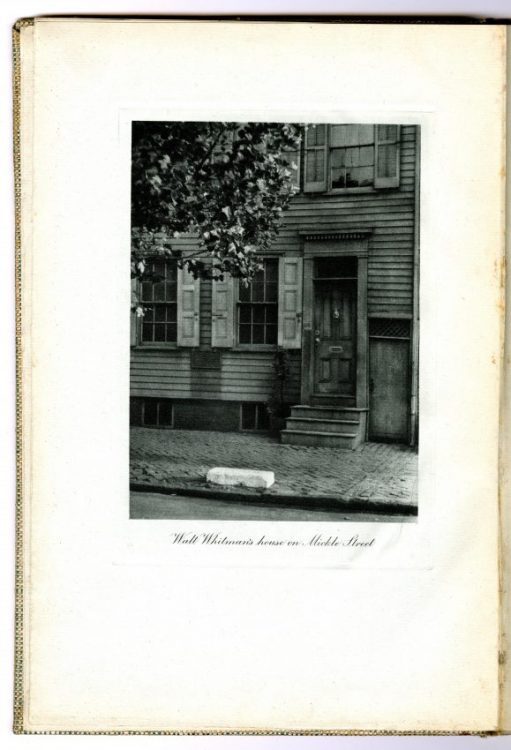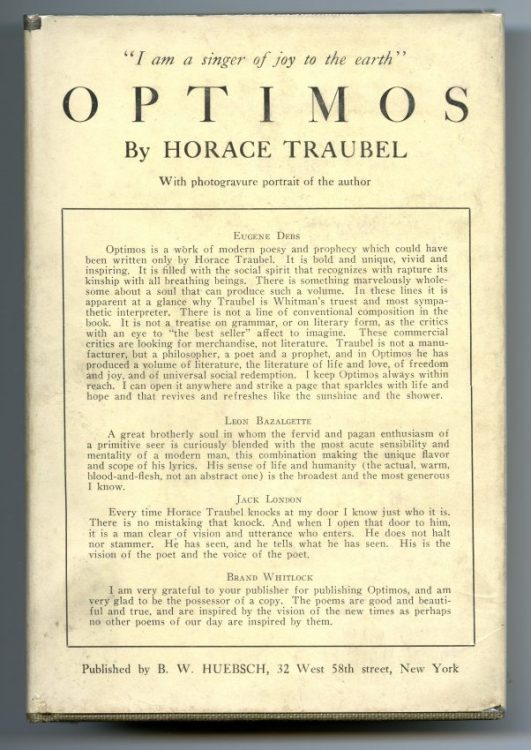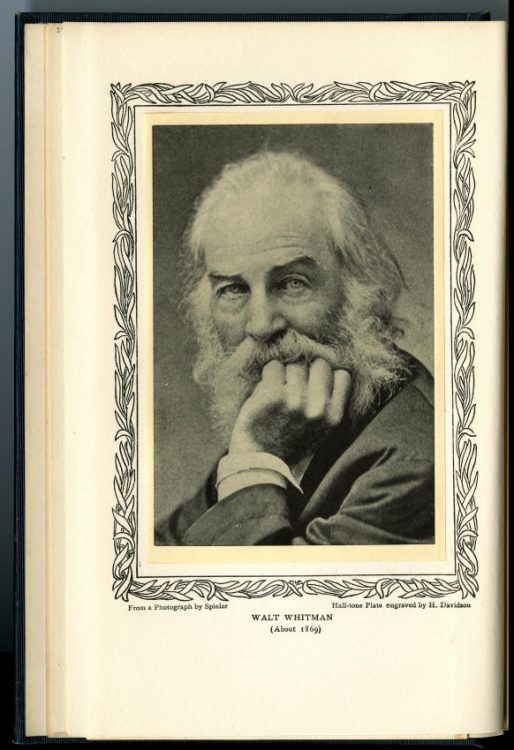Traubel, Horace et al. In Re Walt Whitman. Philadelphia: David McKay, 1893.
This Festschrift includes selections from Whitman’s writings and tributes from his friends and many literary notables.
Whitman, Walt. The Book of Heavenly Death. Portland, Maine: Thomas B. Mosher, 1907. Second edition.
Horace Traubel compiled this selection of poems from Leaves of Grass for the publisher Thomas B. Mosher. This copy bears Horace Traubel's presentation inscription to his close friend Mildred Bain.
Elliot, Charles N. Walt Whitman As Man, Poet, and Friend: Being Autograph Pages from Many Pens. Boston: R.G. Badger, Gorham Press, 1915.
The collector Charles N. Elliot has compiled tributes to Whitman he solicited from friends of Whitman such as John Burroughs, Edward Carpenter, and David McKay, as well as from notables such as Andrew Carnegie, William Dean Howells, Theodore Roosevelt and many others. An original receipt made out to Walt Whitman from the Riverside Paper Mills, dated April 2, 1889, is mounted on the front free endpaper.
Whitman, Walt. Walt Whitman in Camden: A Selection of Prose from Specimen Days. Camden: The Haddon Craftsmen, 1938.
This selection of prose from Specimen Days includes a preface by the British author Christopher Morley and three photographs by the German-born American photographer Arnold Genth. The frontispiece depicts Whitman’s house on Mickle Street in Camden.
Whitman, Walt. Good-bye My Fancy: 2nd Annex to Leaves of Grass. Philadelphia: David McKay, 1891.
Good-bye My Fancy was Whitman’s final miscellany of poetry and prose. In this collection the prose jottings are as interesting as the poems themselves, in their reflections on his poetry, his life, the condition of aging, illness and death.
Traubel, Horace, 1858-1919. Optimos. New York: B.W. Huebsch, 1919.
This collection was Traubel’s most ambitious effort as a poet. In Optimos he attempted to incorporate his own socialist philosophy in the style of his mentor Walt Whitman. Traubel’s socialist readers found Optimos inspiring, but the book received mixed reviews, with the critic H. L. Mencken pronouncing the poems as “dishwatery imitations of Walt Whitman.” The frontispiece photograph is by the American photographer Clarence White (1871-1925).
Whitman, Walt. My 71st Year. [New York: Century, 1889].
Galley proof with an autograph note at the top in the hand of Horace Traubel. It was not uncommon for Whitman to have poems printed as small broadsides. He liked to see how poems looked in print and often made corrections on them. In the published version of this poem Whitman changed part of the third line from "passions of me" to "passions of me, the war of '63 and '4."
Traubel, Horace, 1858-1919. With Walt Whitman in Camden (March 28-July 14, 1888). Boston: Small, Maynard & Co, 1906.
In 1888, Horace Traubel began systematically transcribing his daily conversations with Walt Whitman and continued doing so until Whitman's death in 1892. With Walt Whitman in Camden is a virtual transcript of the daily conversations between Whitman and Traubel, describing Whitman's thoughts and opinions, the arrivals of visitors from all over the world, articles and letters he received and wrote, and hundreds of details of his life on Mickle Street in Camden.
Whitman, Walt. After all, not to destroy but invigorate. [n.p.]: Horace Traubel and Albert Boni, 1913.
This small broadside prints four lines from "Song of the Exposition" in manuscript facsimile. It was the first publication in a series of six facsimile poems of Whitman’s manuscripts.



![My 71st Year. [New York: Century, 1889]. My 71st Year. [New York: Century, 1889].](https://exhibitions.lib.udel.edu/whitman/wp-content/uploads/sites/39/2019/10/My-71st-Year.-New-York-Century-1889.-e1579106112228.jpg)

![After all, not to destroy but invigorate. [n.p.] Horace Traubel and Albert Boni, 1913. After all, not to destroy but invigorate. [n.p.] Horace Traubel and Albert Boni, 1913.](https://exhibitions.lib.udel.edu/whitman/wp-content/uploads/sites/39/2019/10/After-all-not-to-destroy-but-invigorate.-n.p.-Horace-Traubel-and-Albert-Boni-1913.-e1579106124489.jpg)
